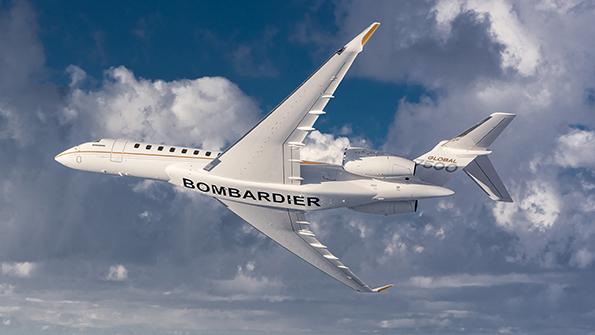Bombardier Flies Into Uncertain Future As Business Aviation Specialist

To generations of aerospace workers and pilots, Bombardier was always known as a scrappy business aviation OEM, even though the Canadian industrial stalwart did more annual business in train-related manufacturing and its origin dates back 83 years as the first snowmobile-maker.
But assuming several recently announced deals close, Bombardier will only be known as a business jet (bizjet) provider—and yet its future may be no less uncertain.
- Asset sales will leave it as a business aviation provider
- Airbus consolidates its control over the A220, with further growth predicted
On Feb. 17, Bombardier announced an agreement to sell its rail-car-based Bombardier Transportation to Alstom of France in a deal that is expected to close in the first half of 2021 and net Bombardier $4.2-4.5 billion. Four days earlier, Bombardier announced it had sold its remaining stake in the Airbus A220, the former Bombardier C Series, for $550 million. Besides cash at closing, in both cases Bombardier gets relieved of future or external obligations that have been haunting it, such as $700 million in no-longer-required payments to Airbus or retirement of the Caisse de depot et placement du Quebec (CDPQ) convertible instrument for $2.1-2.3 billion.
“Following this transaction, Bombardier will be the only major pure play in the bizjet end-market, and we are curious to see how the financial markets receive this,” say JP Morgan analysts. “Currently, we think the equity market perceives bizjets as facing structural challenges and as unappealing from a growth perspective.”
Bombardier had been in talks with Cessna-maker Textron Aviation over the sale of Bombardier Aviation’s business jet division. But those are widely expected to be shelved if the Alstom deal goes through, several analysts say. At the same time, Bombardier leaders are embracing their coming specialty as a business jet-maker and aftermarket provider, contending the embattled company now will be on solid financial footing and a leading player in the business aviation sector.
“Going forward, we will focus all our capital, energy and resources on accelerating growth and driving margin expansion in our market-leading $7 billion business-aircraft franchise,” Bombardier CEO and President Alain Bellemare says.
“We’re just coming out of a massive investment cycle, and we feel today that we have the best product portfolio in the industry,” the Bombardier CEO continues. “Our Global family is strong, actually No. 1, and our Challenger 350 and 650 are still best-selling in their class. So when we look at this right now, we feel very good about where we are. We have a very large installed base, and we’ve spent a lot of money expanding our customer support network, and we will continue to grow our aftermarket business moving forward.”
Analysts on a teleconference with Bombardier managers congratulated them for reaching the train deal with Alstom and CDPQ. Still, the Bombardier Transportation and A220 sales leave Bombardier focused on an industry that many observers have almost wished aloud it were not in, considering the sector’s mixed performance in recent years and the widely held belief that the industry is due for consolidation with too many OEMs still competing.
“The market hasn’t been growing and is hampered by having 40 models of business jets competing for those finite sales,” says Brian Foley, a consultant with Brian Foley Associates.
Indeed, while many consultants and analysts saw Textron as the only logical buyer of Bombardier Aviation, Wall Street was not enthusiastic about Textron doubling down on the industry. A few observers have speculated that even as a standalone business aviation company, Bombardier may eventually merge, but only after its publicly traded share price falls or more costs are taken out.
Bellemare says changes will occur at Bombardier Aviation in preparation for business jets being the sole focus, with “opportunities to optimize cost and flexibility.” But overall, Bombardier as a business aviation company should be a cash generator moving forward. It will count the largest such backlog in the industry at $14.4 billion at the end of 2019, $1 billion more than rival Gulfstream of General Dynamics. Bombardier’s product portfolio includes the lauded Global 7500 among others, which Bombardier managers think could get produced at a rate of mid-30s per year and already has a backlog “well into” 2023.
Bombardier could provide more insight when it reports financial results for the first quarter on May 7. Meanwhile, analysts agree it has a fighting chance due to lower corporate debt, increasing cash flow and Bellemare’s better reputation in managing business aviation versus trains. “As the sector’s premier bizjet with its four fuselage sections, Bombardier’s Global 7500 backlog likely is well-priced; and its cash profitability should improve nicely as it moves down the learning curve,” say Cowen analysts.
“While we are not currently highly constructive on the biz jet market due to soft demand, Bombardier is well-positioned across the subsegments, particularly so in the most profitable large cabin segment where it only competes with Gulfstream,” Credit Suisse analysts agree. “Over time, we would expect excess bizjet capacity to be absorbed, which should enable demand to improve for new jets, which should be supportive of Bombardier Aviation over the long term.”
The Alstom deal is slated to close in the first half of 2021, assuming it gains regulatory approval—no fait accompli in Europe, as antitrust concerns doomed an earlier train tie-up of Alstom and Siemens. But Bombardier executives and financial analysts see the Bombardier-Alstom deal faring better, as their products are more complementary and there are growing concerns about having enough industrial heft to compete with China. By comparison, the A220 sale to Airbus closed immediately after Canadian and Quebec officials secured their government interests.
For its part, Airbus now not only has access to a massive strategic asset in the single-aisle business, but it also no longer is held back by Bombardier’s financial constraints. Airbus has collected 658 orders for the A220-100 and -300 and is in the process of ramping up production. In addition to the original final assembly facility in Mirabel, Quebec, Airbus also is in the process of setting up another A220 line in Mobile, Alabama, to deliver the first aircraft to Delta Air Lines later this year. Mobile is to produce four aircraft per month when it is in full swing.
Equally important, Airbus is free to consider investing further in the A220. Among others, Airbus is in talks with Breeze Airways CEO David Neeleman about a substantial increase in range for the aircraft, to more than 4,000 nm, which would make U.S. transcontinental and transatlantic missions possible. What is more, airlines such as Air France-KLM have been lobbying Airbus to build an A220-500, a stretched version of the -300 that would compete with the Boeing 737-8 and its own A320neo. It would offer, analysts believe, substantially lower unit costs.
Airbus Chief Commercial Officer Christian Scherer says such an aircraft was “not a question of if, but when.”
The A220 is hugely important for Airbus because it enables the OEM to position an A320neo-family replacement upmarket, beginning at 180-200 seats, while still being able to offer an up-to-date product at the lower end of the narrowbody market.
As part of the deal, Quebec will stick to its shareholding in Airbus Canada for three years longer than initially planned and remain a part-owner until at least 2026. Its shares are then “redeemable by Airbus,” giving it the option for full control. Details and conditions of that arrangement are confidential.
Also, Bombardier is selling its A220 and A330 work-package production to Airbus subsidiary Stelia Aerospace, which includes the A220 cockpit and rear fuselage.


